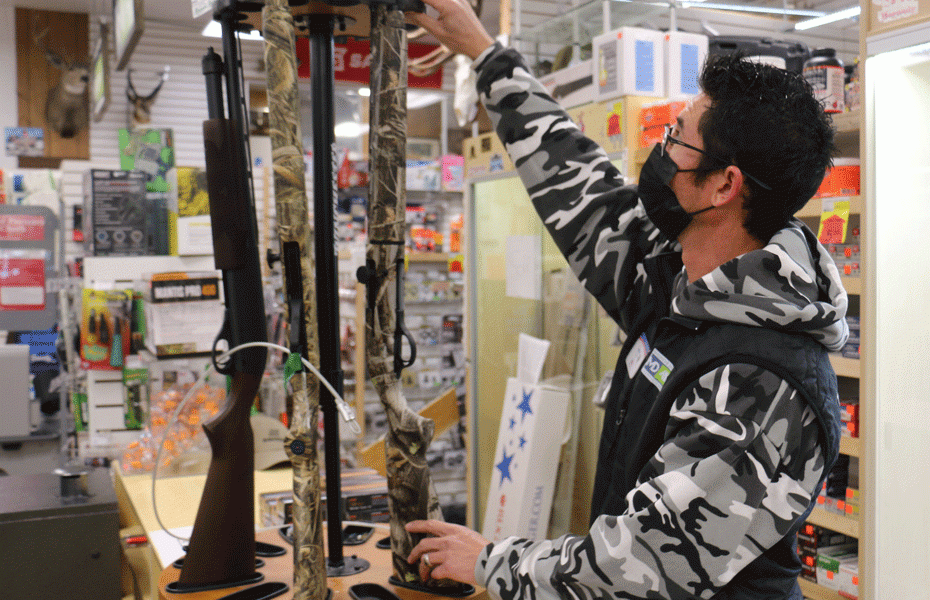VALE – Adam Tolman never saw anything quite like it.
The day after the Nov. 8 election, a steady stream of people began to walk through the doors of Malheur Drug to buy guns.
Tolman, co-owner of Malheur Drug, said he held 60 guns – pistols, rifles and shot guns – in his inventory Nov. 9. As of Friday, he had three shotguns and one handgun remaining to be sold. On Monday, Tolman said he had two guns left to sell.
“It wasn’t a massive rush, just a steady stream of locals coming in,” Tolman said.
Tolman said in the past he’s seen a run on guns after an election “but not like this. Not to this level.”
At the Outdoorsman in Ontario, manager Jeremiah Hartman said while he did not have a count on how many weapons were sold in the wake of the election, he confirmed that guns sales are up.
“We are low on certain pistols,” he said.
He said the gun business at the store has been “steady.”
The gun-buying binge at the two stores occurred in the wake of the passage of Measure 114, or Reduction of Gun Violence Act.
The law passed by a narrow margin – about 25,000 votes – and immediately drew criticism from some county sheriffs in Oregon. Malheur County voters opposed the measure 7,001 to 1,899.
“We keep putting these Band-Aids on but not addressing the real problem until we address the mental health crisis.”
–Brian Wolfe, Malheur County sheriff
Lift Every Voice Oregon is the lead sponsor of the measure. A fact sheet produced by the organization said the measure will create safer schools and communities with background checks and a limit on large-capacity magazines. The measure, according to the fact sheet, will reduce homicides, suicides, gun trafficking and police shootings.
At least four sheriffs – Michelle Duncan in Linn County, Brad Lohrey in Sherman County, Cody Bowen in Union County and Joel Fish in Wallowa County – said they will not enforce specific elements of the new law.
On Friday, Lohrey joined the Oregon Firearms Federation in suing in U.S. District Court, seeking to stop enforcement of the new law and then declare it unconstitutional.
Malheur County Sheriff Brian Wolfe said enforcement of the new gun law will not be a priority for his office.
Measure 114 changes the state’s framework to own or buy a firearm. The measure will require permits issued by police to buy a gun and compel Oregonians to acquire a photo ID, be fingerprinted, conduct gun safety training and undergo a criminal background check. The law also creates a firearms database to be compiled and monitored by the Oregon State Police.
The law will require a $65 payment to apply for the permit, said Wolfe. The permit, he said, would be valid for five years.
The measure also restricts the manufacturing, importing, buying or selling ammunition magazines that can hold more than 10 bullets and makes a violation of that mandate a class A misdemeanor.
“This is a terrible law for gunowners, crime victims and public safety,” Duncan wrote in a Linn County Sheriff’s Office Facebook post the day after the election.
Duncan wrote her office is not “going to be enforcing magazine capacity limits.”
In Union County, Bowen asserted the new law, which goes into effect Dec. 8, is an infringement on constitutional rights. He vowed it would not be enforced by his office.
Wolfe appears to be adopting a more nuanced stance. Wolfe said he grappled with a conflicting pledges and sentiments about the law. On one hand, he said he does not support the measure.
“There are already enough laws on the books to prevent violence committed by the use of a firearm. What are we going to outlaw next? Hammers?” said Wolfe.
On the other hand, Wolfe said “any law enforcement code of ethics I took I will uphold the law.”
“So, it gets tricky for me because I believe it to be contradictive to the Constitution of the United States. Which I believe is the supreme law of the land,” said Wolfe.
He said his office will use a “lot of discretion before even considering enforcing anything of it.”
“It will not be a priority for us at all,” said Wolfe.
Wolfe said there are a range of issues with the new law, including the potential of creating more work for law enforcement agencies across the state. He said just the gun safety training requirement creates new challenges in terms of funding for sheriff’s offices.
“It is basically an unfunded mandate. The people will have to get trained by law enforcement in the jurisdiction they live. The problem is we don’t know exactly what the training has to be. That’s being defined as we speak,” said Wolfe.
Wolfe his office won’t have time to develop a firearms training program before the law goes into effect.
The measure could trigger higher costs in other ways. The measure compels sheriff’s offices and police departments to issue the purchase permits, which, in turn, may require agencies to hire more staff at a time when many law enforcement positions remain empty because they are difficult to fill.
“We already have openings in every division of the sheriff’s office,” said Wolfe.
The Oregon State Police does not have the infrastructure in place to issue permits.
“We are working diligently to ensure we meet the Dec. 8 deadline,” said state police spokesman Capt. Stephanie Bigman.
In a statement Nov. 17, the Oregon State Sheriffs’ Association said “every sheriff’s office and local police department must set up a system to issue these permits.”
“The revenue generated by the permits ($65 for each permit) will not come close to fully funding the required processes. In most law enforcement agencies there is no personnel or money to fund this required program,” the statement said.
The state sheriff’s association said the new law will “result in other public safety resources reduced to cover the costs of implementing a new permit program.”
The association said as soon as the law goes into effect Dec. 8, “all firearms sales by dealers, at gun shows and most private transfers (other than to a close relative) in Oregon will immediately stop.”
“Until such time as all or part of the measure is stayed or found unconstitutional by a court, the measure is the law in Oregon,” the association said in its statement.
Wolfe said he also not comfortable with the law’s mandate to create a data base of gun owners.
“It is intrusive. By that database somebody who wants a particular gun, all they have to do is go on to the data base and see I bought one of those guns and then break into my house and get it,” said Wolfe.
Wolfe said the law misses the point of curbing gun violence.
“We keep putting these Band-Aids on but not addressing the real problem until we address the mental health crisis,” he said.
The law, he said, is “not reasonable.”
“All the while, citizens are not going to be able to completely exercise their Second Amendment rights,” said Wolfe.
Wolfe said he believes the measure will face legal challenges in the future.
“I do believe that most parts of the measure will be struck down by the courts. Or the Legislature will try to fix it,” he said.
A similar gun violence reduction law in New York state was struck down by the U.S. Supreme Court in June. That 100-year-old law required residents to establish a need to carry a concealed weapon in public for defense.
The court concluded the law violates the Second Amendment.
News tip? Contact reporter Pat Caldwell at [email protected]
EXCELLENCE IN JOURNALISM – Available for $7.50 a month. Subscribe to the digital service of the Enterprise and get the very best in local journalism. We report with care, attention to accuracy, and an unwavering devotion to fairness. Get the kind of news you’ve been looking for – day in and day out from the Enterprise.




